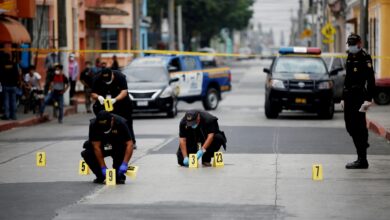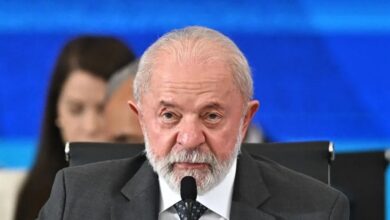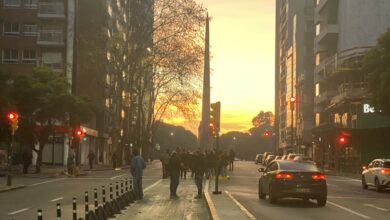What’s coming for Venezuela
Listen this article
After the impediment of the entry of humanitarian aid and the return of Juan Guaidó to Venezuela, what's next for that country?

After a concert to collect funds; that humanitarian aid did not enter the country and the arrival of Juan Guaidó after a diplomatic tour of Latin America, opens a new chapter in the current Venezuelan situation.
Leer en español: Lo que viene para Venezuela
LatinAmerican Post had the opportunity to attend the Foro Semana, ¿qué va a pasar en Venezuela?, where different diplomats and academics could give their point of view on the situation in the neighboring country.
Acting Ambassador
The ambassador (interim) of Venezuela, Humberto Calderón Berti, in dialogue with Alejandro Santos, argued and explained his priorities as ambassador, emphasizing prudence within the framework of his functions , "I want to represent the government of Guaidó with dignity (…) what The last thing I want to see is a military intervention by Colombia towards Venezuela. "
In addition, he raised the attention to the migratory dramas, having as a pillar the attention of the people. Likewise, he considered the recovery of the country important. Calderón, who excelled in the oil sector, stressed that once the Madurista regime leaves power, "elections will be held."
On the other hand, he stressed the importance of the Lima Group: "it has been decisive in the articulation of diplomatic affairs (…) has given a different to the opposition." For Calderón it is very important to maintain international pressure and internal marches as fuel for the return of democracy, although he rules out any possibility of military intervention.
With regard to the international support that the government of Maduro, Russia, and China in particular still has, Calderón said that the government of Guaidó "intends to forge good relations with the whole world." " We have no problem in maintaining clear and friendly relations with Russia or China. Your business can continue. The risk is running now. Maduro has no way to pay the current debt, "he concluded.
Hoy en el Foro de la Revista Semana “¿Qué va a pasar en Venezuela?” @ForosSemana. Analizamos la situación actual del país desde diversas perspectivas y los avances del Presidente @jguaido #PlanPaís #VamosBien pic.twitter.com/K5mFhea8Wm
— Humberto Calderón B. (@calderonberti) 7 de marzo de 2019
You may be interested in reading: Venezuela: could there be a military intervention?
The challenge of Colombia: migration
According to information from the Migración Colombia observatory of Semana magazine, around 1,600 Venezuelans cross the border every day. Given this, Winston Martinez, general secretary of Migration Colombia, explained the challenges that the Colombian government had to face to try to quantify the Venezuelans who entered the country. Thus, through a series of processes, it was possible to grant transit permits or some type of clear documentation that presented the information of the migrant.
Similarly, with Venezuelans who decide to stay in the country, another challenge is presented. For Felipe Muñoz, Frontier Manager with Venezuela of the Presidency of the Republic, integration in the Colombian economy must be generated. "600,000 people can be effectively integrated into the economy." Which contributes to the country's economy and social development.
En @ForosSemana analizando #FuturoVenezuela con funcionarios de gobierno, académicos y analistas. Temas migratorios, de seguridad y económicos. @jerrymcdermott @FrancescaRamosP @OV_URosario @A_Mejia_H @MonoGonzalezGR @UNGRD @andres_molanor @BruceMacMaster @marcelaprietobo pic.twitter.com/QjMnYb3w6w
— Felipe Muñoz (@felipemgomez8) 7 de marzo de 2019
On the other hand, Eduardo González, director of the National Unit for Disaster Risk Management (UNGRD), affirms that from his entity different scenarios are also generated to manage migration from Venezuela: "to help Venezuelans in Venezuela" with the delivery of food, medicines, or essential items necessary for the daily life.
Security at the border
After a report revealed the presence of groups outside the Colombian law (ELN, the dissidence of the FARC, among others) in Venezuelan territories, the alarm went off again.
For Jeremy McDermott, executive director and co-founder of Insight Crime, there are several key points by which these groups are exercising in Venezuela, among which is a mafia state, a loss of control of arms by the Bolivarian forces; In the case of the ELN, it is not known with precision how much percentage of its members are Colombian or Venezuelan, which allows them to walk freely in different territories and influence the state organs, among others.
For Francesca Ramos, Director of the Observatory of Venezuela at the Universidad del Rosario, the levels of tension, added to the lack of communication between the two states, further aggravate the situation on the border.
On the other hand, facing the future situation of the country, Ramos affirms that "the change has already begun, it is not known which way it took". Meanwhile, McDermott says that in order to reach a clear agreement, the two sides have to give in and he has to be aware that whoever rises to power will also have to govern with the opposition party".
LatinAmerican Post | Laura Viviana Guevara Muñoz
Translated from "Lo que viene para Venezuela"





